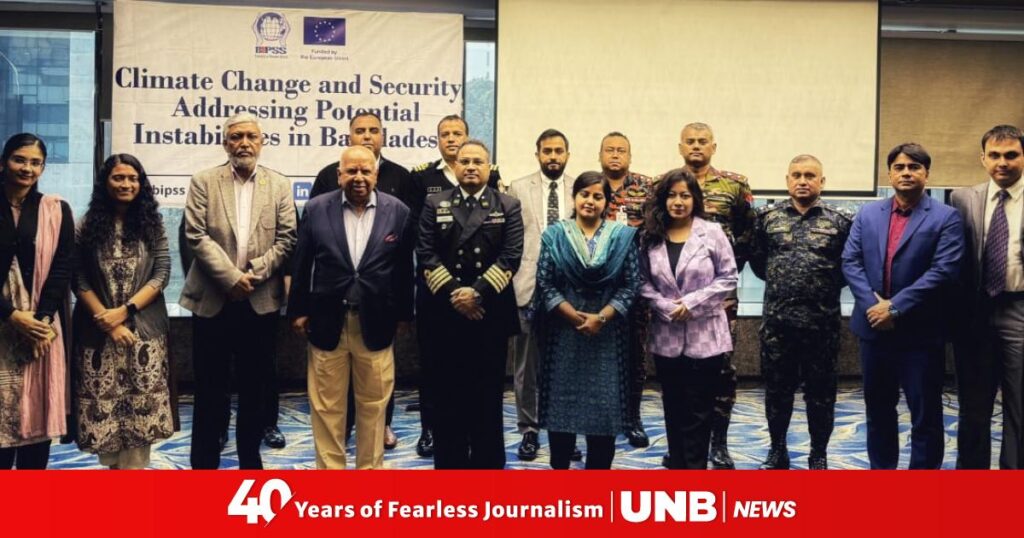BIPSS President Major General (Retd) ANM Muniruzzaman has emphasised the necessity of developing a comprehensive national policy to address rising temperatures, sea-level rise, and other climate-induced risks, which could result in catastrophic consequences, including the loss of 20% of Bangladesh’s landmass and mass displacement.
He made the remarks while addressing at a workshop on “Climate Change and Security: Addressing Potential Instabilities in Bangladesh” hosted by Bangladesh Institute of Peace and Security Studies (BIPSS) with the support from the European Union.
The event brought together researchers, journalists, NGO officials, and representatives from the Ministry of Foreign Affairs, Ansar and Village Defence Party, Bangladesh Fire Service & Civil Defence, Border Guard Bangladesh, Navy Headquarters, Coast Guard, Police Staff College, Bangladesh Police, Defence Services Command and Staff College, and other security agencies.
Ancient climate crisis offers warning on modern ocean acidification: study
The President of BIPSS highlighted the growing importance of addressing climate change as a national and regional security issue due to its potential to destabilize societies and exacerbate existential threats.
Despite being a frontline state, Bangladesh lacked a clear strategy to tackle these challenges.
The workshop aimed to bring together stakeholders to deliberate on crafting a robust national strategy to mitigate these threats and ensure sustainable security and stability.
It featured prominent speakers, including Shafqat Munir, Senior Research Fellow at BIPSS, and Commodore (Retd) Sheikh Mahmudul Hasan, Deputy Director, Centre for Bay of Bengal Studies, Independent University, Bangladesh.
Additionally, a video presentation by Alice C. Hill, David M. Rubenstein Senior Fellow for Energy and the Environment at the Council on Foreign Relations, Washington, D.C., added valuable insights to the discussions.
The presentations and discussions explored the pressing challenges posed by climate change and fostered innovative collaboration among stakeholders.
They also highlighted the transformative role of security sectors in driving resilience and sustainable solutions.
Environmental groups sue over California support for polluting biofuels
The workshop began with Shafqat Munir’s presentation, which focused on climate change as a “threat multiplier,” emphasizing its role in exacerbating vulnerabilities such as resource scarcity, economic instability, and displacement.
He stressed the importance of integrating climate policies into security frameworks, leveraging tools like the Climate Security Mechanism to address socio-political risks.
This was followed by a video presentation that outlined the military’s transition from traditional roles to humanitarian assistance, emphasising the need for threat-specific strategies and addressing climate disinformation as a barrier to coordinated responses.
Commodore Sheikh Mahmudul Hasan emphasised the transformative role of security sectors in addressing climate change, advocating for a shift from traditional defense roles to proactive climate resilience efforts.
Highlighting the concept of “climate security,” he underscored the need for cross-sector collaboration, early warning systems, and sustainable practices to mitigate climate risks.
His call for integrating climate adaptation into national security strategies aligned with global sustainability goals, stressing the importance of building disaster-resilient infrastructure and enhancing institutional capacities to combat the multifaceted impacts of climate change.
The event concluded with a question-and-answer session that emphasised the vital role of the security sector in responding to climate change by contributing to disaster preparedness, resilience building, and sustainability through the efforts of military, police, and intelligence agencies at both national and international levels.
Muniruzzaman summarized the key takeaways and outlined future directions for addressing climate-security challenges in Bangladesh.

